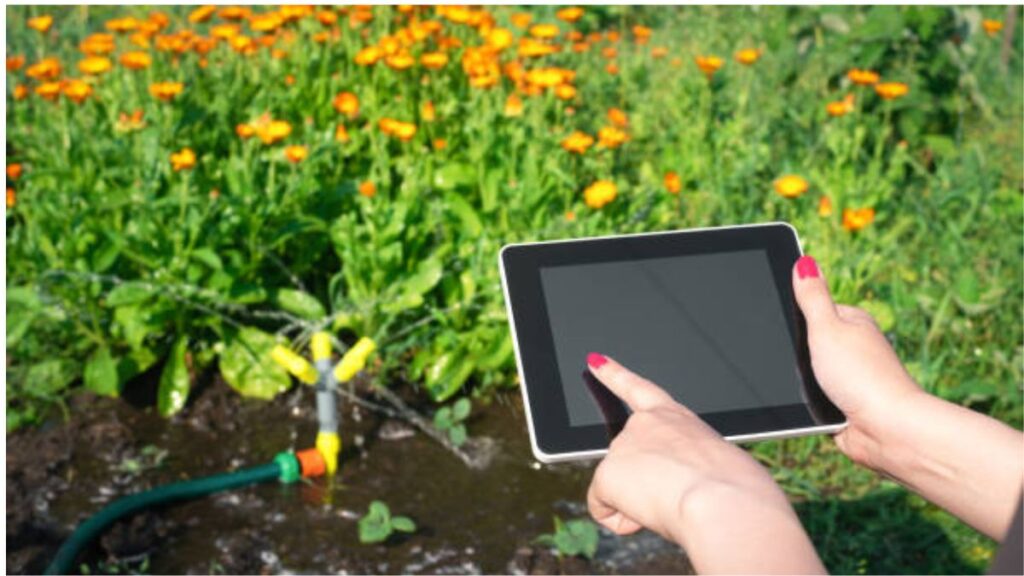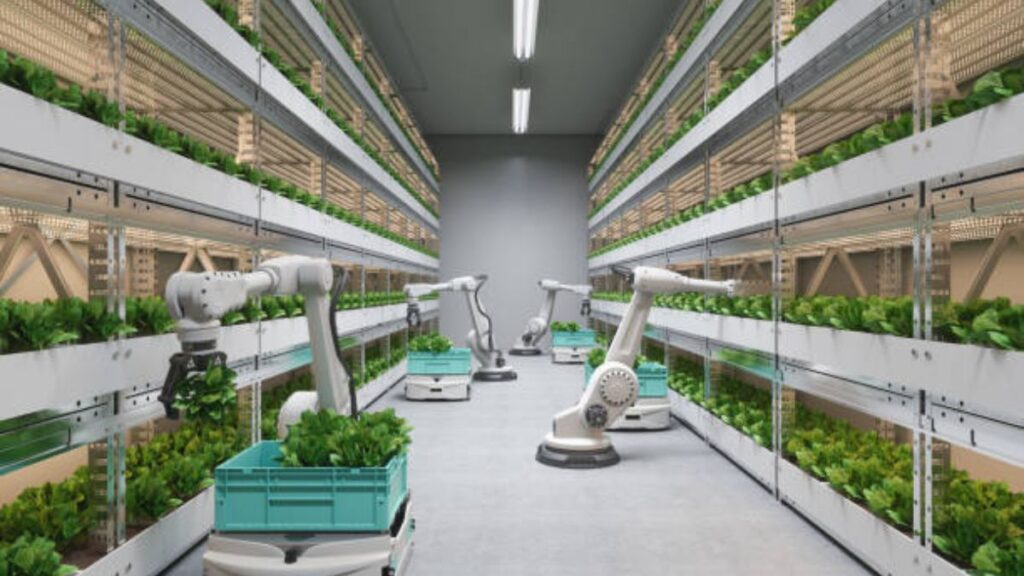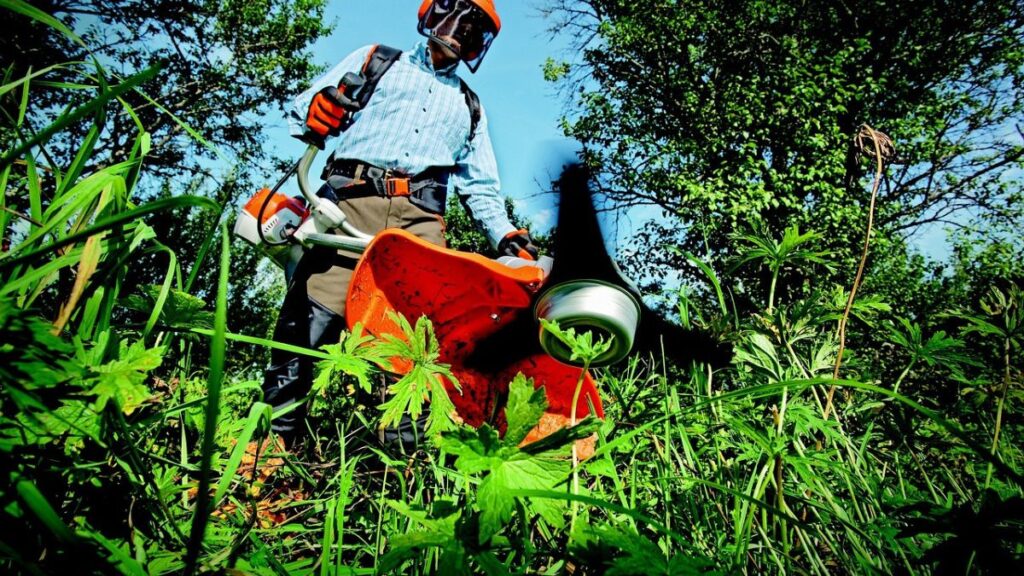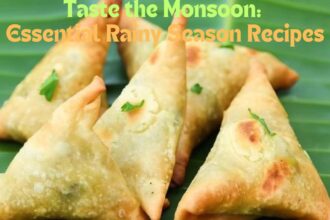Introduction:-
Top Smart Gardening Tools for Optimal Growing Conditions

Welcome to the era of intelligent horticulture, where technological advancements converge with customary practices. As an increasing number of gardeners embrace the convenience and precision of contemporary tools, the task of maintaining a flourishing and productive garden has become notably simplified. Whether you possess extensive experience in gardening or are embarking on this endeavor for the first time, incorporating intelligent devices into your garden can significantly enhance efficiency and ensure optimal growing conditions. Here we present the foremost smart gardening tools designed to empower you to achieve exceptional outcomes in your herb garden.
What are the best smart gardening tools for beginners?
1. Automated Irrigation Systems
Consistent and adequate hydration of gardens is imperative for optimal plant growth. Automated irrigation systems, encompassing smart irrigation controllers and drip irrigation kits, ensure the delivery of the requisite amount of water at the appropriate time. These systems can be programmed to dispense water based on predefined schedules, prevailing weather conditions, and soil moisture levels.
Advantages:
- Conservation of water resources through the prevention of excessive irrigation.
- Provision of consistent hydration to plants, promoting growth and health.
- Remote control capabilities via smartphone applications, enabling convenient management.
Recommended Products:
- Rachio 3 Smart Sprinkler Controller: Dynamic adjustment of watering schedules based on weather forecasts and soil moisture conditions.
Orbit B-hyve Smart Hose Faucet Timer: Direct connection to hoses, facilitating simple automation of irrigation routines.
2.Soil Sensors: A Vital Tool for Successful Gardening
- Introduction:
- Soil sensors play a crucial role in helping gardeners understand their soil’s needs and make informed decisions about watering, fertilizing, and overall plant care.
- Benefits:
- Optimal Soil Conditions: Maintaining ideal soil conditions for plant growth.
- Moisture Management: Preventing both overwatering and underwatering.
- Soil Health Insights: Providing valuable information about soil health and nutrient levels.
- Key Features:
- Parameters Measurement: Measuring essential soil parameters like moisture, temperature, and pH levels.
- Real-Time Data: Delivering real-time data for immediate decision-making.
- Data Accessibility: Allowing gardeners to access data remotely, often through smartphone apps.
- Top Picks:
- Xiaomi Mi Plant Flower Care Soil Sensor:
- Monitors multiple soil parameters, including moisture, temperature, light, and nutrients.
- Parrot Flower Power:
- Provides comprehensive insights into a plant’s needs and sends alerts to the user’s smartphone.
- Xiaomi Mi Plant Flower Care Soil Sensor:
- Conclusion:
- Soil sensors empower gardeners with valuable data, enabling them to create thriving and healthy gardens with ease.
3. Plant Health Monitors – Essential Gardening Tools:
Plant health monitors are indispensable tools for gardeners, offering early detection of diseases, pest infestations, and other issues that can affect their plants. Utilizing advanced sensors and algorithms, these devices continuously monitor plant health, alerting you to potential problems before they become severe.
Benefits of Using Plant Health Monitors:
- Early Detection: Timely detection of diseases and pests allows for prompt intervention and treatment, preventing their spread and minimizing damage to your garden.
- Continuous Monitoring: Plant health monitors provide ongoing surveillance of your plants, ensuring their well-being and enabling you to adjust care routines accordingly.
- Reduced Risk of Plant Loss: By catching issues early, plant health monitors help reduce the risk of plant loss, preserving the beauty and biodiversity of your garden.
Top Picks:
- PlantLink Soil Moisture Sensor: Accurately tracks soil moisture levels and alerts you when your plants need watering.
- Koubachi Wi-Fi Plant Sensor: Monitors soil moisture, temperature, and light, providing personalized care instructions through a user-friendly mobile app.
4.Smart Weather Stations
Smart weather stations offer real-time weather data to help you plan your gardening activities effectively. They monitor essential environmental factors like temperature, humidity, and rainfall that directly impact plant growth.
- Assists in planning watering and fertilizing schedules, ensuring optimal plant growth.
- Provides accurate and localized weather forecasts, helping you prepare for weather changes.
- Easily integrates with other smart gardening tools for a comprehensive gardening management system.
Top Picks:
- Netatmo Weather Station: Measures temperature, humidity, and air quality, along with providing precise weather forecasts.
Ambient Weather WS-2902C: Offers extensive weather data, including wind speed and direction, rainfall amount, and UV radiation levels.
5.Digital Garden Management: Revolutionizing Gardening
Harness the power of digital assistants with garden management apps, your all-in-one solution for keeping track of planting schedules, watering routines, and plant health. These apps seamlessly integrate with various smart gardening tools, creating a centralized platform that simplifies garden management and provides a wealth of gardening information.
Benefits:
- Simplified Garden Management:
- Streamlined garden maintenance with reminders and alerts for tasks.
- Effortless organization of planting schedules and watering routines.
- Personalized Plant Care:
- Detailed plant databases and care guides tailor-made for your garden.
- Access to information about plant characteristics, including growth habits, sunlight requirements, and watering needs.
- Enhanced Plant Health:
- Regular monitoring and tracking of plant health.
- Timely identification of potential issues and pests.
Top Picks:
- Gardenize:
- Document your garden with photos and notes to keep a visual record of growth and progress.
- Create to-do lists and set reminders for garden tasks, ensuring nothing slips through the cracks.
- PlantSnap:
- Use your smartphone camera to snap pictures of plants and get instant identification.
- Access detailed care instructions and expert advice for each identified plant.
Smart lighting systems simulate natural sunlight for indoor plants, providing adequate light, adjustable light settings, and energy efficiency.
Top Picks:
- Philips Hue Indoor Garden Lighting Kit: Customizable LED lighting.
- Roleadro LED Grow Light: Full-spectrum lighting.
How does AI technology enhance smart gardening tools?
AI transforms smart gardening tools with a myriad of sophisticated features and capabilities, revolutionizing plant care efficiency and effectiveness. Let’s explore key ways in which AI enhances these tools:

1.Precise Plant Identification
AI-powered applications like PlantNet and PictureThis leverage image recognition to accurately identify plant species from photographs. This enables gardeners to swiftly learn about encountered plants and their unique care requirements
2.Tailored Care Guidance
AI algorithms process data on specific plants, environmental conditions, and user habits to generate personalized care plans. Apps like Planta offer customized advice on watering, fertilization, and light exposure, ensuring optimal growth conditions for each plant
3.Early Detection of Pests and Diseases
AI facilitates the diagnosis of plant health issues by identifying symptoms of diseases and pests from images. Features like Plant Doctor in the Planta app diagnose issues and suggest remedies, enabling gardeners to address problems promptly and effectively
4.Automated Monitoring and Notifications
Smart gardening tools with AI continuously monitor plant conditions and send real-time alerts to users. These tools employ sensors to track vital metrics such as soil moisture, temperature, light levels, and more, providing timely reminders and updates to ensure proper care
5.Data-Driven Insights and Recommendations
AI analyzes extensive datasets to present insights into plant growth patterns and environmental factors. By aggregating data from numerous users, AI detects trends and provides recommendations based on broader observations, leading to improved gardening practices and healthier plants
6.Voice and Chatbot Assistance
Certain AI-enhanced gardening tools incorporate voice-activated assistants or chatbots that offer instant support and guidance. These features allow users to ask questions and receive immediate responses, making plant care more accessible and convenient
7.Integration with IoT Devices
AI seamlessly integrates with Internet of Things (IoT) devices, including smart watering systems and climate control units. This integration facilitates automated adjustments based on real-time data, optimizing growth conditions without the need for constant manual intervention
In summary, AI technology revolutionizes smart gardening tools by providing accurate identification, personalized care, early disease detection, automated monitoring, data-driven insights, interactive assistance, and seamless integration with IoT devices. These advancements make gardening more efficient and successful,
What are the top plant health monitors available in 2024?
In 2024, several top plant health monitors and apps stand out for their advanced features and user-friendly interfaces. Here are some of the best options available:

- Planta:
- Features: Customized care instructions, watering reminders, light meter, and plant health diagnosis.
- Pros: Tailored advice for each plant, health tracking, and educational content.
- Cons: Some advanced features require a premium subscription, and frequent notifications can be overwhelming.
- Platforms: iOS, Android.
- Pricing: Free with in-app purchases for advanced features (EcoCation) (EcoCation).
- Vera:
- Features: User-friendly design, care schedules, and practical care tips.
- Pros: Completely free, simple to use, effective care schedules.
- Cons: Limited advanced features compared to paid apps.
- Platforms: iOS, Android.
- Pricing: Free (EcoCation).
- PlantNet:
- Features: Plant identification with detailed information and disease identification.
- Pros: Accurate identification of around 20,000 species, comprehensive plant data.
- Cons: Primarily focused on identification, lacks personalized care guidance.
- Platforms: iOS, Android.
- Pricing: Free (EcoCation).
- Blossom:
- Features: Extensive plant library, personalized care schedules, plant journal, and expert advice.
- Pros: Intuitive interface, detailed plant information, and personalized care schedules.
- Cons: Advanced features require a premium subscription, privacy concerns regarding data sharing.
- Platforms: iOS, Android.
- Pricing: Free with optional premium subscription (EcoCation).
- PictureThis:
- Features: Plant identification, care instructions, and a community platform.
- Pros: Highly accurate identification, large plant database, and community engagement.
- Cons: Free version has limited credits, high pricing for premium features.
- Platforms: iOS, Android.
- Pricing: Free with premium subscription options (EcoCation).
Conclusion
Incorporating smart gardening gadgets into your herb garden promises to elevate your horticultural endeavors. Embrace the latest technological advancements with automated watering systems, soil sensors, plant health monitors, and smart lighting. These gadgets offer the precision and ease you need to create the optimal conditions for your plants to thrive. Step into the future of gardening, where technology meets nature, and enjoy a flourishing, abundant garden with the assistance of smart gardening tools.
FAQs
Q1: What is smart gardening?
A1: Smart gardening involves using technology to manage and optimize gardening tasks. This includes tools like automated watering systems, soil sensors, plant health monitors, and garden management apps to ensure optimal growing conditions for plants.
Q2: How do automated watering systems save water?
A2: Automated watering systems save water by providing the exact amount of water plants need based on soil moisture levels, weather conditions, and programmed schedules. This prevents overwatering and ensures efficient water use.
Q3: What do soil sensors measure?
A3: Soil sensors measure various parameters such as soil moisture, temperature, pH levels, and sometimes nutrient levels. This data helps gardeners make informed decisions about watering and fertilizing.
References
- Automated Watering Systems:
- Rachio 3 Smart Sprinkler Controller: Rachio
- Orbit B-hyve Smart Hose Faucet Timer: Orbit
- Soil Sensors:
- Xiaomi Mi Plant Flower Care Soil Sensor: Xiaomi
- Parrot Flower Power: Parrot
- Plant Health Monitors:
- PlantLink Soil Moisture Sensor: PlantLink
- Koubachi Wi-Fi Plant Sensor: Koubachi






